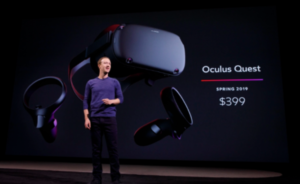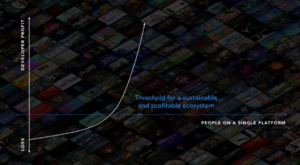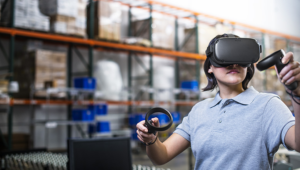The Oculus Quest, the virtual reality industry’s first all-in-one six degrees of freedom headset, was released last week and represents the first time VR has been given a chance to reach the masses. We had high expectations for the Quest and are happy to report that, after spending nearly a week with the device, they were handily exceeded. Facebook and Oculus have pulled off what was once considered impossible.

As Facebook’s CTO Mike Schroepfer revealed last week, the company wasn’t sure the Quest was going to be possible. He said in a Facebook post: “I remember the vigorous debates about whether it was possible to build the product. Inside-out tracking was in the research phase and the idea of doing it on a mobile chip was thought impossible by many. Now the product just works”.
Not only does it work, the Quest puts a smile on the face of anyone who tries it and introduces them to the wonders of virtual reality unlike any accessible HMD before. Everyone we have shown the Quest to has come away with a new appreciation for VR.

For the first time in VR’s history, the VR experiences that turn skeptics into believers are as accessible as slipping on a headset. As of last Tuesday, the VR industry is on a new path towards the mainstream.
Mainstream media has similar sentiments:
- Forbes – The Oculus Quest Is The Most Impressive Consumer Gadget In Years
- Fast Company – The iPod of VR is here, and you should try it. Never before have I seen a single technology improve so quickly.
- WIRED – So far, VR has failed to deliver on the true promise of virtual reality. The Oculus Quest finally does. You turn it on, and you’re there.
Watch the advertisement for the Quest titled “Defy Reality”
As of this writing, the headset is sold out on Amazon and consumers are reporting empty Best Buy shelves. User feedback on Reddit, Facebook, and Twitter has been overwhelmingly positive.
The future of VR was riding on the success of this device. Not just from a sales figures perspective, but for industry optimism to retain and reignite investment of time and capital into the space. All signs point towards the Quest being the catalyst VR needed to take the consumer, enterprise, and developer ecosystems to the next level.
Why the Quest Is Important for Consumers
Up until now, compelling virtual reality experiences required a $1300+ investment if you didn’t already own an expensive, high powered PC. Anyone who has tried a 3DoF (Samsung Gear VR, Google Daydream) then 6DoF HMD (Oculus Rift, HTC Vive) knows there is just no comparison. 6DoF, hand presence, and freedom of movement are required for a truly compelling VR experience. 3DoF HMDs were more accessible but largely underwhelming. Many have tried a Samsung GearVR or even Oculus Go only to come away questioning what all the VR hype was about. We can’t stress this enough – now, for $399 instead of $1500, anybody can have access to a compelling VR experience.
The unit sales of compelling VR headsets had an upper bound on the number of high powered PCs in the world. Now, VR’s market only has an upper bound of people/households with $399 to spend, and we expect the price will continue to decrease over time.
Why the Quest Is Important for Developers
Before the Quest, game developers had little financial incentive to create games and experiences for VR due to the fractional size of the VR audience compared to traditional or mobile gaming markets. This led to a chicken and egg scenario for VR to go mainstream: there needed to be enough headsets to incentivize developers to create hardware-selling content; but who would buy hardware with little software in the first place? Thanks to investment from Facebook and forward-thinking developers excited to create for a new medium, the Quest has a good enough content library to sell plenty of headsets to begin creating a self-sustaining developer ecosystem. This will drive both VR hardware and software investment forward exponentially with an expectation for a healthy and growing ROI.

One limitation the Quest has is processing power for compute-intensive VR experiences. There was a reason VR used to require a high powered PC. This was the number one concern for the Quest leading up to the launch – will the device be able to handle quality experiences? The answer, impressively, is yes. Sure, many PCVR experiences are not Quest compatible, but enough were ported to the Quest to make the launch library much better than was once expected.
Future iterations of the Quest will have significantly better silicon and techniques like foveated rendering to give developers exponentially more room to work with. Developers will also get better at maximizing resource requirements of their games in order to sell their experiences to the growing user base.
Why the Quest Is Important for Enterprise VR
It’s been clear since the beginning that the impact of VR goes far beyond gaming and entertainment. VR is a tool that allows you to simulate anything. From there, the use cases are limitless. Over the next five years, we will increasingly see enterprises tap into the power of VR to innovate. Real estate agents will give digital property tours, history professors will take their students into the trenches of WWI, and retailers will allow customers to stroll through a virtual store.

3DoF headsets were getting the job done in cases such as Walmart buying 17,000 Oculus Go headsets to use for staff training in every one of its stores, but those training experiences were limited to a laser pointer as a controller to interact with a digital environment. PCVR headsets with hand presence were much better to naturally interact with and learn in but were not practical or mobile enough for scale.
With the launch of the Quest, Oculus is relaunching Oculus for Business, an “enterprise solution designed to streamline and expand virtual reality in the workplace.” Just like consumers, enterprises will now have access to hand presence and 6DoF movement to implement.
These Are The Good Old Days
Years from now we’ll look back at the launch of the Oculus Quest as the start of a new industry. Virtual reality’s mainstream adoption and tremendous impact on humanity is coming. How long it will take and future winners and losers will be widely disputed, but it’s hard to deny the potential of a tool that has the power of infinite simulation.
A technology wave like this only comes along every few decades. We are lucky to be here for the beginning of it. These are the good old days and 2019’s Oculus Quest is so clearly the beginning of something that will change the world forever.
Disclaimer: We actively write about the themes in which we invest or may invest: virtual reality, augmented reality, artificial intelligence, and robotics. From time to time, we may write about companies that are in our portfolio. As managers of the portfolio, we may earn carried interest, management fees or other compensation from such portfolio. Content on this site including opinions on specific themes in technology, market estimates, and estimates and commentary regarding publicly traded or private companies is not intended for use in making any investment decisions and provided solely for informational purposes. We hold no obligation to update any of our projections and the content on this site should not be relied upon. We express no warranties about any estimates or opinions we make
